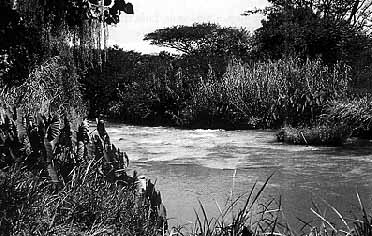
Opportunities and responsibilities for research in tropical plant biology are strongly affected by the threatened status of tropical ecosystems, particularly tropical moist forests. Research priorities are thus influenced by the need to complete research before entire ecosystems are destroyed and component species are rendered extinct. Research priorities are also influenced by the need for information necessary to develop strategies protecting remaining ecosystems or restoring damaged ones.
High-quality research in tropical plant biology is also likely to uncover phenomena
 |
|---|
| View of the Umgeni River above Albert Falls in Natal, South Africa. Phragmites mauritianus can be seen in the foreground along the water's edge. Elephant's ear (Colocasia antiquorum) can be seen to the left. Courtesy: Ray F. Evert. |
A growing understanding of the interactions between animals and plants in tropical ecosystems provides increasing opportunities for understanding the organization of food webs in tropical ecosystems, the complexity of tropical ecosystems, and the ecological and evolutionary processes that maintain biotic diversity in the tropics.
An important challenge for research in tropical ecosystems will be to understand the functional ecology of ecologically and economically important taxa, with particular attention to the integration of levels of organization and their contribution to plant survival.
The functional ecology of individual species will contribute increasingly to an understanding of how tropical forests respond to global climate change.
The greatest cultural and scientific importance of this research is its bearing on the continued existence of tropical ecosystems, the greatest reservoir of biotic diversity on our planet.
Research in tropical plant biology would fit well with the research thrusts outlined by the National Science Foundation. At present the funding from all sources to support this research is inadequate.
There is a small pool of bright and motivated students with a love for plants and the natural ecosystems in which they grow. Students will continue to be attracted to this discipline by a love for plant life and a fascination about their evolution and function. The tropics can continue to stimulate generations of students to carry on these studies.




